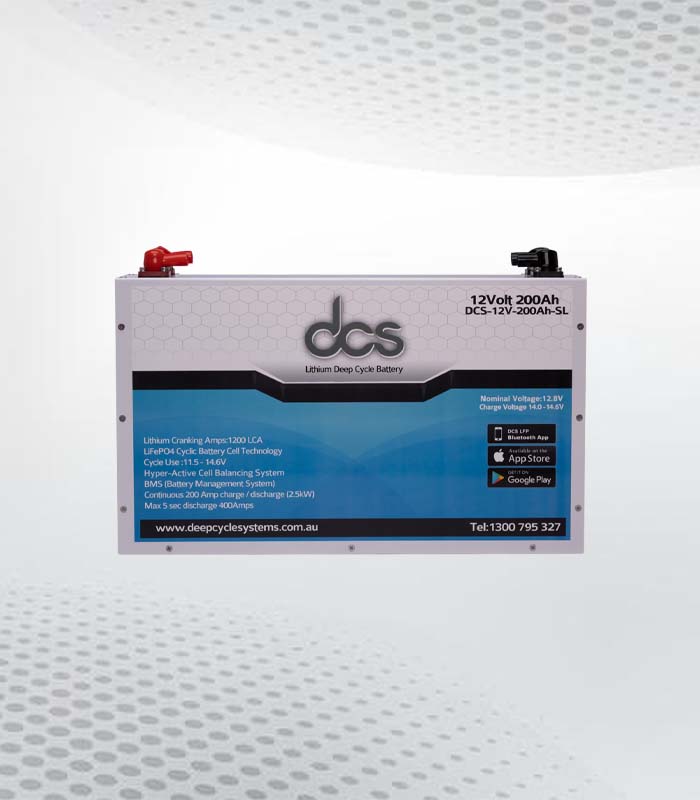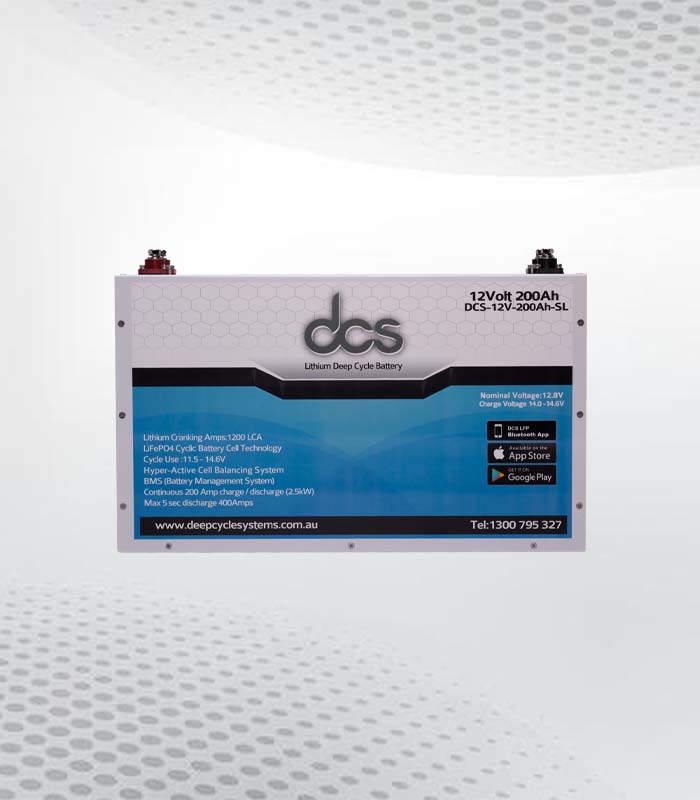When selecting a deep-cycle RV battery, there are a few factors to consider. Agm deep cycle rv battery offers the highest level of power and efficiency for a variety of applications. With a range of voltages to choose from, it can be difficult to know which one is best for your vehicle or RV. In this blog post, we’ll look at the differences between 12v and 6v deep cycle leisure batteries, the benefits of AGM technology, and our top tips for selecting the perfect AGM deep-cycle rv battery.
What Is A Deep Cycle Rv Battery?
A deep cycle rv battery is a type of battery specifically designed to provide long-lasting power for recreational vehicles (RVs) and other off-grid applications. Unlike a starter battery, which is designed to provide a high burst of power to start an engine, a deep-cycle battery is designed to deliver a steady amount of power over an extended period. This makes it ideal for powering the electrical systems in an RV, such as lights, appliances, and electronics, when the vehicle is not connected to shore power.
Deep cycle RV batteries are constructed using thicker plates and a different chemical composition than starter batteries. This allows them to withstand the frequent charging and discharging cycles that are typical in RV applications. They are also designed to be discharged to a greater extent than starter batteries without suffering damage. In addition to their durability, deep-cycle RV batteries also offer a high capacity, meaning they can store a large amount of energy.
Understanding Voltage And Amp Hours
Understanding voltage and amp hours is crucial when choosing the perfect AGM deep-cycle RV battery. These two factors determine the power capacity and duration of the battery, allowing you to make an informed decision based on your specific needs. Voltage refers to the electrical potential difference between the positive and negative terminals of a battery. In the case of deep cycle RV batteries, the most common options are 12v and 6v. A 12v battery is more common and versatile, suitable for most RV applications. On the other hand, a 6v battery is typically used in pairs, creating a 12v system with increased capacity.
The Benefits Of Agm Technology
AGM (Absorbent Glass Mat) technology offers a range of benefits that make it an excellent choice for deep-cycle RV batteries. One of the biggest advantages of AGM batteries is their maintenance-free operation. Unlike traditional flooded lead-acid batteries, AGM batteries do not require regular maintenance such as checking water levels or topping up with distilled water. This makes them much easier to use and maintain, saving you time and effort.
AGM batteries also have a longer lifespan compared to other battery types. They are designed to withstand repeated charge and discharge cycles without losing their capacity. This means you can rely on your AGM deep-cycle rv battery for longer periods before needing to replace it. Another benefit of AGM technology is its resistance to vibration and shock. This makes AGM batteries ideal for RV applications where the battery may be subject to constant movement and rough terrain.
Factors To Consider When Choosing A 12v Deep Cycle Leisure Battery
Choosing the right 12v deep cycle leisure battery is crucial for ensuring reliable power and maximizing your outdoor adventures. There are several factors to consider when making this decision.
Power Needs
Firstly, you need to evaluate your power needs. Consider the appliances and electronics you plan to use in your RV and calculate their power requirements. This will help you determine the capacity and amp hours (Ah) needed for your battery. Remember, the higher the Ah rating, the longer your battery will last.
Size And Weight
Next, think about the size and weight of the battery. RVs have limited space, so it’s important to choose a battery that fits comfortably in your vehicle. Additionally, consider the weight of the battery as it can impact the overall weight and balance of your RV.
Battery’s Durability
Another factor to consider is the battery’s durability and resistance to vibration. Since RVs often travel on rough terrains, it’s important to choose a battery that can withstand the constant movement and shocks.
Price
Lastly, don’t forget about the price. While quality batteries may come at a higher cost, they usually offer better performance and durability in the long run.
By considering these factors, you can make an informed decision and select the perfect deep-cycle RV battery that meets your specific needs and enhances your outdoor experiences.
Choosing The Best Rv Deep Cycle Battery For Your Needs
Choosing the right size RV battery is essential for ensuring reliable power and optimal performance during your outdoor adventures. The size of the best rv deep cycle battery will directly impact its power capacity and how long it can provide power to your RV’s electrical systems. To determine the right size battery for your needs, you need to consider a few key factors.
- Firstly, assess your power requirements. Think about the appliances and electronics you plan to use in your RV and calculate their power needs. This will give you an idea of the capacity and amp hours (Ah) you will need for your battery. Remember, the higher the Ah rating, the longer your battery will last.
- Next, evaluate the available space in your RV. RVs have limited space, so it’s important to choose a battery that fits comfortably in your vehicle. Consider the dimensions and weight of the battery to ensure it doesn’t overload your RV or affect its balance.
- Additionally, think about the battery’s durability. RVs often travel on rough terrains, so it’s crucial to select a battery that can withstand constant movement and shocks. Look for batteries that are designed to be vibration-resistant and durable.
Lastly, consider your budget. While quality batteries may come at a higher cost, they usually offer better performance and longevity in the long run. Consider the overall value and lifespan of the battery when making your decision.
Maximizing Battery Life With Proper Usage And Maintenance
Proper usage and maintenance are key to maximizing the lifespan and performance of your deep-cycle RV battery. By following these tips, you can ensure that your battery operates at its full potential and lasts for as long as possible.
- Firstly, it’s important to use your battery correctly. Avoid overcharging or over-discharging the battery, as this can lead to irreversible damage. Invest in a quality battery charger that has built-in safety features to prevent overcharging. Additionally, try to avoid running your battery down to a very low state of charge, as this can shorten its lifespan. Instead, recharge the battery when it reaches around 50% to 70% capacity.
- Regular maintenance is also crucial for keeping your deep-cycle RV battery in optimal condition. Check the battery terminals regularly for any signs of corrosion and clean them if necessary. Make sure the connections are tight and secure to prevent any loose connections that could lead to voltage drops.
- It’s also a good idea to periodically check the water levels in your battery if it’s a flooded lead-acid type. Add distilled water as needed to maintain the proper electrolyte levels. However, if you have an AGM battery, this step is not necessary as they are maintenance-free.
- Lastly, consider the storage conditions for your battery when not in use. Extreme temperatures can negatively impact battery performance and lifespan. If possible, store your battery in a cool, dry place to avoid temperature extremes.
By following these guidelines for proper usage and maintenance, you can ensure that your deep-cycle RV battery serves you well and provides reliable power for all your adventures on the road.
Maintaining Your Deep-cycle rv battery
Proper maintenance is crucial for keeping your deep-cycle rv battery in optimal condition and ensuring it lasts for as long as possible. By following these tips, you can maximize the lifespan and performance of your battery, allowing you to enjoy uninterrupted power during your outdoor adventures. Regularly check the battery terminals for any signs of corrosion and clean them if necessary. Corrosion can hinder the flow of electricity and affect the battery’s performance. Tighten the connections to prevent any loose connections that could lead to voltage drops.
If your battery is a flooded lead-acid type, periodically check the water levels and add distilled water as needed to maintain the proper electrolyte levels. However, if you have an AGM battery, this step is not necessary as AGM batteries are maintenance-free. Consider the storage conditions for your battery when not in use. Extreme temperatures can negatively impact battery performance and lifespan. Ideally, store your battery in a cool, dry place to avoid temperature extremes.
Maximizing The Lifespan Of Your Rv Battery
To ensure your deep-cycle rv battery lasts as long as possible, it’s important to follow some simple steps to maximize its lifespan. By taking care of your battery, you can enjoy reliable power during your outdoor adventures for years to come. First and foremost, avoid overcharging or over-discharging your battery. This can cause irreversible damage and shorten its lifespan. Invest in a quality battery charger with built-in safety features to prevent overcharging, and recharge the battery when it reaches around 50% to 70% capacity.
FAQs
Q: Can I Use A 12v Deep Cycle Leisure Battery Instead Of A Dedicated RV Battery?
A: Yes, you can use a 12v deep cycle leisure battery for your RV. Just make sure to choose one with sufficient capacity to meet your power needs. However, dedicated RV batteries are specifically designed for the demands of RV applications and may offer better performance and durability.
Q: Can I Mix Different Brands Of Deep-Cycle Batteries In My RV?
A: It is generally recommended to avoid mixing different brands of deep-cycle batteries in your RV. Mixing batteries with different chemistries, capacities, or ages can lead to imbalances in the charging and discharging process, which can shorten battery life and performance.
Q: Do I Need To Use A Battery Charger Specifically Designed For AGM Batteries?
A: While it is not mandatory to use a battery charger specifically designed for AGM batteries, it is highly recommended. AGM batteries have different charging requirements compared to other battery types, and using a charger designed for AGM batteries can help ensure proper charging and maximize battery life.
Q: Can I Use Solar Panels To Charge My AGM Deep-cycle rv battery?
A: Yes, solar panels can be a great way to charge your AGM deep-cycle rv battery. Just make sure to use a solar charge controller to regulate the charging process and prevent overcharging.
Q: Can I Install The AGM Deep-cycle rv battery Myself, Or Do I Need Professional Help?
A: Installing an AGM deep-cycle rv battery can typically be done by yourself, especially if you have some basic knowledge of electrical systems and battery installation. However, if you are unsure or uncomfortable with the process, it is always a good idea to seek professional help to ensure a safe and proper installation.
Q: How Can I Dispose Of My Old AGM Deep-cycle rv battery?
A: AGM deep cycle RV batteries contain hazardous materials and should not be disposed of in regular trash. It is important to take them to a designated recycling facility or return them to the manufacturer or a battery retailer for proper recycling and disposal.
Conclusion
In conclusion, choosing the perfect AGM deep-cycle rv battery is essential for ensuring reliable power and maximizing your outdoor adventures. By considering factors such as voltage, amp hours, durability, and price, you can make an informed decision that meets your specific needs. AGM technology offers numerous benefits, including maintenance-free operation, a longer lifespan, resistance to vibration and shock, and a lower self-discharge rate.



